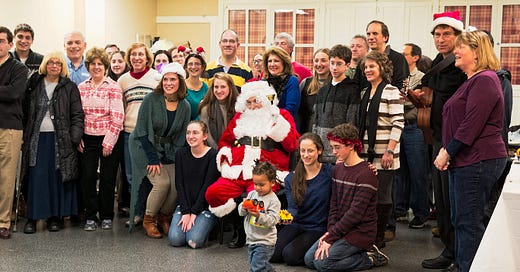How should a Jew respond to ‘Merry Christmas’?
Here's a one-word answer that is far better than saying 'I'm sorry, I don't observe Christmas'
For over 30 years, I have joined my congregants at local shelters on Christmas Eve, bringing joy - and Santa - with us, and lots of gifts for the kids. And the first thing I wish to everyone is “Merry Christmas.” Which brings to mind this seasonal question:
Q: Rabbi, it’s that time of year, when everyone everywhere is saying “Merry Christmas” to me, even people who know that I am Jewish. Should I simply smile and repeat the greeting or politely correct the greeter and say, “I’m sorry, I don’t observe Christmas?”
A: Now I know why Lenny Bruce said that Christians celebrate while Jews observe. We never get to be happy, even at this most celebratory time of year. We’re always observing. And in December, we’re always agonizing over how to find our little niche in this annual Yuletide cultural bombardment.
There is nothing wrong with wishing a non-Jewish neighbors “Merry Christmas,” just as it would not be a betrayal for them to wish you “Shabbat Shalom” when leaving work on Friday afternoon. In the Shulchan Aruch, Rabbi Moses Isserles notes the need for being good neighbors in a society where Jews and non-Jews mingle and do business together, even regarding problematic greetings. It’s all done for the sake of peace. The idea is to reduce tensions, not increase them.
It’s even halachically OK to mention a holiday whose name includes the name of a foreign deity. At least it is in this case, since the word “Christ” is not really a name at all, but the Greek translation of the Hebrew term for “Anointed One.” If the holiday were called “Jesus-fest” or “Zeus-mas, there might be cause for concern. So when I speak with my Christian clergy colleagues, I have no problem acknowledging their holiday in my seasonal salutations.
Ironically, Jews tend not to label our festivals when extending greetings. We traditionally just say “Happy Holiday” on Passover or Sukkot (“Hag Sameach” in Hebrew or “Gut Yomtov” in Yiddish). The only exception to that rule happens to be Hanukkah. We say “Hag HANUKKAH Sameach” or Hag Urim (Festival of Lights) Sameach” in order to distinguish this minor non-biblical festival from the more significant biblically mandated holidays.
A greeting should be seen as a verbal embrace, the extension of blessing, rather than as an assertion of xenophobic power. In a perfect world, “Happy Holidays” would not be seen as a cheapening of the meaning of Christmas, but as an enhancement of its deepest spiritual message.
But as we all know, this is far from a perfect world. We are living at a time when any slight verbal utterance can be interpreted as an uttered verbal slight. Someone wishing me a “Merry Christmas,” knowing that I am a rabbi, must ipso facto be antisemitic.
Right?
That’s how far down the rabbit hole we’ve gone.
Even now, when there are plenty of real antisemites out there, I prefer to refrain from searching for them under every rock. So, let’s try to get beyond the clichéd salutations that have backed everyone into a corner. If you feel that someone is deliberately trying to impose upon you the hegemony of Christmas, wishing you a “Merry Christmas” while knowing that you are Jewish, let’s look for a reply that is both respectful of diversity yet deeply spiritual, something that could be uttered simultaneously to Jon Stewart and Bill O’Reilly without blinking an eye. Here are my nominations:
“Wishing you a Blessed Season!” (Sounds too much like Red Skelton, or a Debbie Friedman song, not that there’s anything wrong with Debbie Friedman songs.)
“May the Light Increase” (Sounds a bit too Star Warsy)
“Peace” (A little too ’60s, especially if you are wearing a Nehru jacket)
“Shalom”
Think about it. Shalom is perfect. These days, everyone knows what it means – like schlemiel and chutzpah. The reply is spiritual, identifiably Jewish yet increasingly universal. Listen to a parade of Christian leaders lining up to speak at a conclave supporting Israel. You’ll hear more “Shalom”s uttered there than in the hallways of the Knesset, where the politicians are more likely to be spitting at one another.
So the next time someone who knows you are Jewish says “Merry Christmas” just to get a rise out of you, take the high road and elevate the conversation by replying “Shalom.” But if it’s simply a total stranger on the street, movie theater or supermarket, “Merry Christmas” or “Happy Holidays” would be equally fine.
Anything but, “Oy vey. My children never call!”





Or... you could try "Namaste Rohatsu!" (peaceful Bodhi day in the Buddhist world), Matunda ya Kwanza!, (particularly if your greeter has some African ancestry) or, when the season is right, even "Salaam Eid Al Fitr" (As historically this Muslim festival has occasionally been coincident with both Christmas and Hannukah). But bottom line, you hit the nail on the head rabbi. We should have enough Yiddischkeit in our hearts to never be offended by anything even perceived as a challenge, but always attempt good fellowship and raising the exchange to a higher level. Keep up the good work!